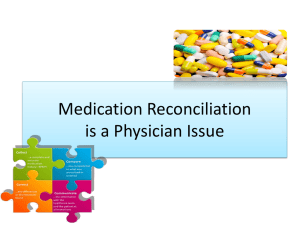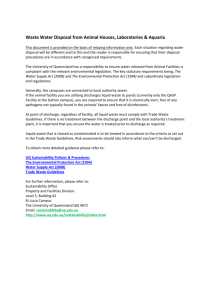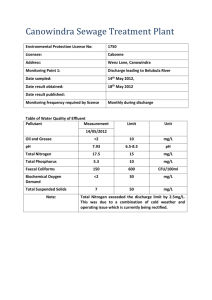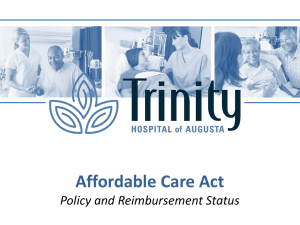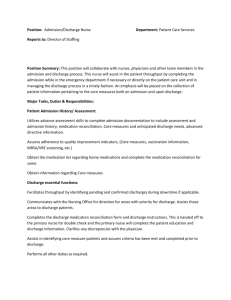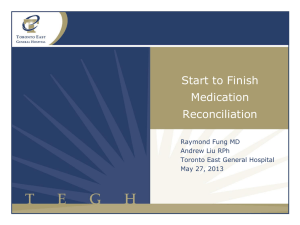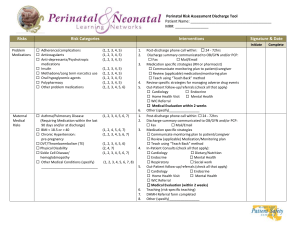Horizon Transfer MedRec Team Charter v2
advertisement
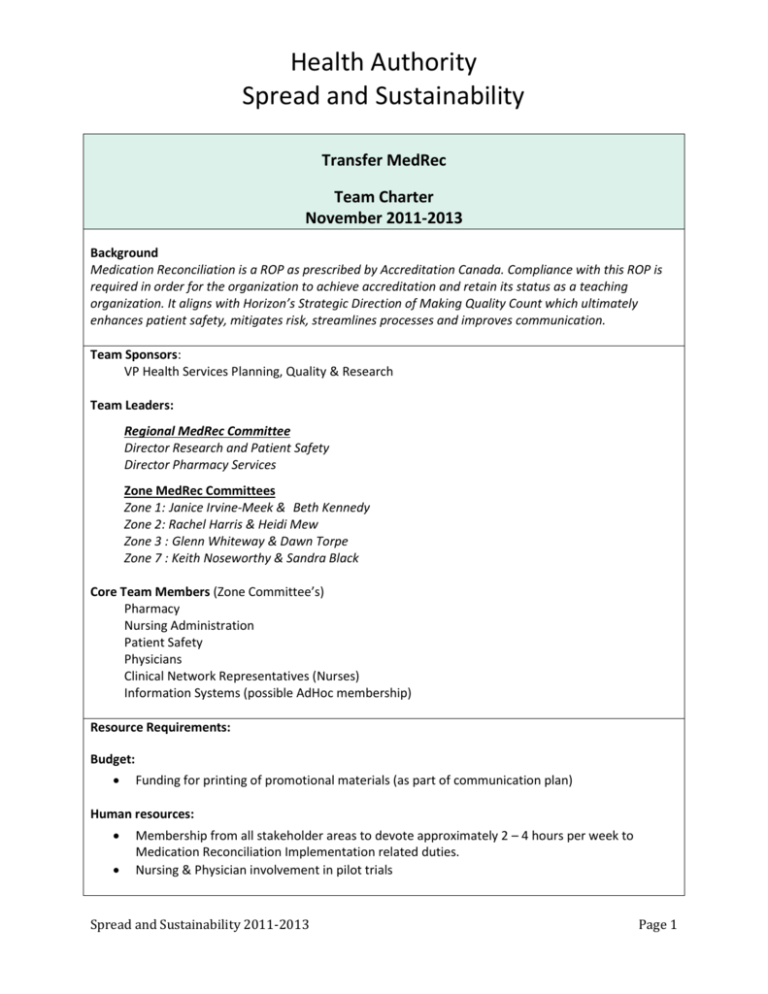
Health Authority Spread and Sustainability Transfer MedRec Team Charter November 2011-2013 Background Medication Reconciliation is a ROP as prescribed by Accreditation Canada. Compliance with this ROP is required in order for the organization to achieve accreditation and retain its status as a teaching organization. It aligns with Horizon’s Strategic Direction of Making Quality Count which ultimately enhances patient safety, mitigates risk, streamlines processes and improves communication. Team Sponsors: VP Health Services Planning, Quality & Research Team Leaders: Regional MedRec Committee Director Research and Patient Safety Director Pharmacy Services Zone MedRec Committees Zone 1: Janice Irvine-Meek & Beth Kennedy Zone 2: Rachel Harris & Heidi Mew Zone 3 : Glenn Whiteway & Dawn Torpe Zone 7 : Keith Noseworthy & Sandra Black Core Team Members (Zone Committee’s) Pharmacy Nursing Administration Patient Safety Physicians Clinical Network Representatives (Nurses) Information Systems (possible AdHoc membership) Resource Requirements: Budget: Funding for printing of promotional materials (as part of communication plan) Human resources: Membership from all stakeholder areas to devote approximately 2 – 4 hours per week to Medication Reconciliation Implementation related duties. Nursing & Physician involvement in pilot trials Spread and Sustainability 2011-2013 Page 1 Health Authority Spread and Sustainability What are you trying to accomplish? Aim: Implement Medication Reconciliation within all Horizon zones to accurately and completely reconcile medications at points of Transfer and Discharge. Through the leadership and direction of the Regional Medication Reconciliation Committee (R-MEDREC), each zone within Horizon Health Network will form a respective Zone Medication Reconciliation Committee (Z-MEDREC), These zone based committee’s will formulate a comprehensive project plan that will guide the implementation of medication reconciliation at all necessary points of patient transfer and discharge. Key components: Leadership, guidance and support of R-MEDREC Development of Medication Reconciliation Committees and Working Groups (if deemed necessary by Z-MEDREC) Development of Project Plan Review of existing zone transfer/discharge processes and forms Creation of zone transfer/discharge processes and forms for Medication Reconciliation Development and implementation of Communication Plan (as part of project planning) Development and implementation of zone specific MedRec education/training Trial runs in designated pilot areas for transfer and discharge(if deemed necessary by Z-MEDREC) Complete education/training, communication and full Implementation of processes and forms for MedRec at transfer and discharge by June 2013. Scope and Boundaries: R-MEDREC In Scope: Implementation planning at the regional level Guidance and support on MedRec topics/issues (e.g. Regional decisions for high level issues) Coordination and communication with Zone MedRec Committee’s Development of regional level education program Future development of indicators for Medication Reconciliation Reporting to senior leadership and other necessary stakeholders Out of Scope: Human resources for replacements of R-MEDREC/Z-MEDREC members Development of zone specific MedRec forms and processes Development of zone specific training and delivery Implementation planning at the zone level Boundaries: MedRec implementation will be for Horizon Health Network zones only and will not Spread and Sustainability 2011-2013 Page 2 Health Authority Spread and Sustainability cover other departments, organizations or healthcare facilities outside Horizon. Z-MEDREC In Scope: Implementation planning for the specific zone Coordination with Regional MedRec Committee, as appropriate Development and implementation of zone-specific MedRec processes, forms, education/training, communication, etc. Out of Scope: Human resources for replacements of zone medrec committee members and staff receiving training Boundaries: Staff workload and competing zone-level projects/initiatives Improvement Objectives: 1. Increase the awareness of medication reconciliation amongst staff through promotion. 2. Educate staff on performing medication reconciliation processes on appropriate patients at the points of transfer and discharge. 3. All services that have the MedRec Required Organizational Practice (ROP) assigned to them in their Accreditation Canada Standards, demonstrate that they actively perform medication reconciliation processes on appropriate patients at the points of transfer and discharge Spread and Sustainability 2011-2013 Page 3 Health Authority Spread and Sustainability Measures Current Performance Goal (Baseline) (Preferred) Outcome Measure: Number of instances where Medication Discrepancies discovered (Medication Incidents Avoided) NA How will we know a change is an improvement? Process Measures: Number of Services/Zone performing Medication Reconciliation at Transfer Total number of Services required by Accreditation Canada ROP to perform MedRec at Transfer Number of Services/Zone performing Medication Reconciliation at Discharge Total number of Services required by Accreditation Canada ROP to perform MedRec at Discharge Number of times Transfer MedRec is performed Total number of transfers requiring Transfer MedRec Number of times Discharge MedRec is performed Total number of discharges requiring Discharge MedRec Number of incomplete Transfer MedRec performed Total number of Transfer MedRec attempted NA 0% Number of incomplete Discharge MedRec performed Total number of Discharge MedRec attempted NA 0% Spread and Sustainability 2011-2013 NA 100% NA 100% NA 100% 100% NA Page 4 Health Authority Spread and Sustainability Other Measures Under Consideration: o o o o o o o o Number of unreconciled medications. Number or percentage of unreconciled medications within specific timeframe. Number or percentage of medication orders changed. Number of potential medication errors intercepted. Number of discrepancies per patient. Percentage of patients with completed Transfer form in chart. Percentage of patients with completed Transfer form in chart. Number of pharmacy consults. Spread and Sustainability 2011-2013 Page 5 Health Authority Spread and Sustainability Change Concepts and Ideas to test Eliminate Waste Use of electronic tools that can incorporate active medications into the Transfer and Discharge MedRec process can greatly reduce the amount of time required to perform medication reconciliation compared to hand-written formats. Incorporate discharge instructions into Discharge MedRec forms to eliminate need to fill out multiple forms (i.e. Discharge instructions, follow-up appointment forms, etc) Improve Work Flow What Changes can we make that will lead to an improvement? Give physicians electronic access to electronic forms for transfer and discharge Change the Work Environment With the size and complexity of MedRec, Z-MEDREC are encouraged to form working groups to split workload into manageable tasks: o Transfer Working Group o Discharge Working Group o Education Working Group o Special Assignment Working Group Manage Variation Use of electronic tools that can incorporate active medications into the Transfer and Discharge MedRec process. The elimination of hand written information has been shown to: o Decrease transcription errors o Decrease information interpretation errors o Decrease omission errors Enhance Customer relationship Incorporate discharge instructions into Discharge MedRec forms to effectively communicate important medication information, changes to medication, special instructions for discharge care and reminders of future follow-up appointments. This will enhance communication for several customers: o o o o Family physicians Community Pharmacists Institutions receiving discharged patients Patient Spread and Sustainability 2011-2013 Page 6 Health Authority Spread and Sustainability Principles for Working Together: Through the leadership and direction of the Regional Medication Reconciliation Committee (R-MEDREC), each zone within Horizon Health Network will form a respective Zone Medication Reconciliation Committee (Z-MEDREC), who will be responsible to design and implement medication reconciliation processes, procedures, tools and education specific to their zone. All levels of committee’s should have a multidisciplinary composition and when possible, consider outside agencies and institutions as they are a part of the discharge process that is being created for MedRec. How will we manage the improvement work? Areas that have existing MedRec processes in place, should consider a balanced distribution of MedRec duties that involves, Nurses, Physicians, LPN’s, Pharmacy Techs, Pharmacists and other professions. Communication is essential to this project and must be both and vertical and horizontal between: o Executive Sponsor(s) o R-MEDREC o Z-MEDREC o Working Groups o Staff Other general principles for working together include: Demonstration of respect, for other members and their perspectives Regular attendance and participation Timely follow up on assigned tasks Only positive attitudes are allowed! Roles and Responsibilities Executive Team Sponsor: Provide support & guidance Provide adequate resources Establish an accountability or reporting mechanism to monitor progress Help to resolve issues as needed within the team Team Leader (Process Owner): Schedule and facilitate meetings Prepare meeting agendas Circulate meeting agendas and minutes prior to monthly meetings Upload meeting minutes and agendas to Horizon Q Drive Upload team information to SHN QIM Spread and Sustainability 2011-2013 Page 7 Health Authority Spread and Sustainability Monitor Plan, Do, Study, Act (PDSA) cycles and measurement data Facilitate communication with team and other stakeholders Communication of key messages and regular updates. Measurement Lead: Assist with collection and measurement of indicator data Prepare reports for key stakeholders Team Members: Participate in Safer Healthcare Now! SS-FLS virtual learning sessions Formulate and utilize a project plan for regionalization of medication reconciliation at admission, transfer, and discharge Utilize PDSA cycles to implement change Support education and training requirements for sustainability and spread Direct the process to collect measurement data Analyze data, audit process and evaluate results to make system changes based on evidence and trending Where appropriate, direct the development and/or participate in sub-committees and/or working groups Share learning within the organization Lead and support coworkers to adapt the new process Complete tasks or assignments within and between meetings Ongoing communication and sharing of information back to individual site/discipline MedRec teams Constraints Time constraints / Competing Priorities of team members Human Resources Wide variations in process and practices across region Travel Restrictions Deliverables and Key Milestones Full implementation of MedRec processes at the points of transfer and discharge by June 2013. Communication Plan Spread and Sustainability 2011-2013 Page 8 Health Authority Spread and Sustainability At discretion of R-MEDREC and Z-MEDREC Meeting Schedule: R-MEDREC will meet on a monthly basis and R-MEDREC Members be available to respond to Z-MEDREC inquiries and requests. Z-MEDREC will meet monthly (minimum) Working Groups will meet with enough frequency to complete their assigned tasks This charter was prepared by: _________________________ Date: _________________________ Senior Management Approval: _______________________ Date: _________________________ (Executive Sponsor) Spread and Sustainability 2011-2013 Page 9
